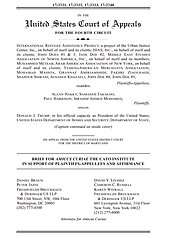Learn more about Cato’s Amicus Briefs Program.
Since January 27, 2017, the federal government has endeavored to ban immigration of nationals from at least six African and Middle Eastern countries for at least 90 days. In September, it added North Korea to the list of banned countries and made the ban indefinite. The issue in this appeal is whether the district court erred in issuing a preliminary injunction against the revised order based, in part, on its findings that plaintiffs were likely to succeed in proving that aspects of the order violated the Establishment Clause and the Immigration Nationality Act and that an injunction would not harm the public interest. Cato filed this brief to provide evidence to inform the court’s review.
The government claims to have selected these seven countries after applying a set of nine “neutral” baseline criteria to every country in the world. Yet this is untrue. It refused to ban dozens of countries that failed the criteria, but did ban countries that met the criteria. It applied higher-than-baseline criteria in order to justify the ban, but then never applied those more stringent criteria to the other countries. The criteria simply do not explain the government’s selections.
Moreover, the government asserts that it cannot obtain sufficient information to adjudicate visa applications for nationals of these countries. Yet under the law, the government has no obligation to gather any information merely to process applications. Visa applicants bear the burden of proof. If applicants cannot obtain certain information to prove their eligibility, they are denied. The government’s own data demonstrate that consular officers have rigorously enforced this burden of proof and responded appropriately to the changing circumstances within these countries on an individualized basis. Thus, the only applicants impacted by the ban are those who can prove their eligibility.
Finally, the government claims that individualized vetting is “less reliable” in screening out terrorists and criminals from these countries than others. This claim is also baseless. The ban would not have prevented the entry of any terrorist who entered since 9/11 and went on to plan or attempt an attack, and not a single national of one of these countries has killed anyone in a terrorist attack since 1975. Moreover, the Census Bureau data indicate these nationals are significantly less likely to commit serious crimes in the United States than nationals of other countries or people born in the United States. The government’s justifications for the ban are without merit.
Cato filed a similar brief in the related Ninth Circuit case, Hawaii v. Trump (here).
Freshfields Bruckhaus Deringer US LLP served as counsel to the Cato Institute. The attorneys on the briefs were Daniel Braun, Peter Jaffe, David Y. Livshiz, Cameron C. Russell, and Karen Wiswall.

